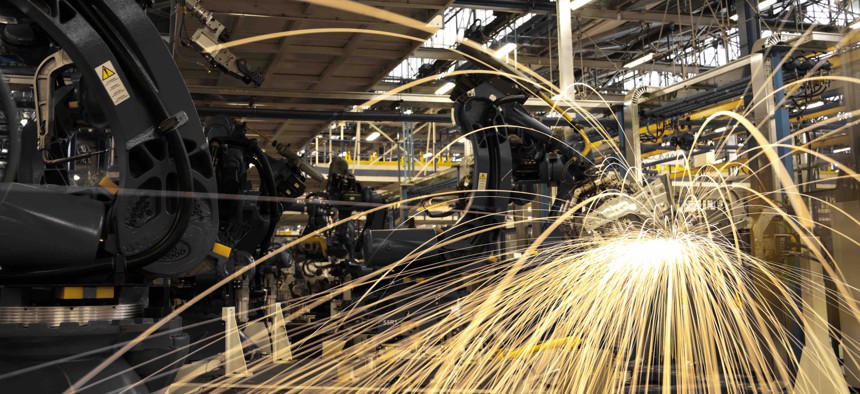The Latest State to Notch a Win in the Race to Attract EV Factories

States are competing against each other with massive subsidies to attract electric vehicle factories. gerenme via Getty Images
The deal will involve building a new $4 billion electric vehicle battery plant with 4,000 jobs. Like others in recent months, it involves hundreds of millions of dollars in tax incentives.
After upping the ante with a new set of tax breaks, Kansas landed a commitment this week from Panasonic Corp. to build a new factory for electric vehicle batteries that promises to be the world’s largest.
Panasonic, an electronics company based in Japan that builds batteries for Tesla vehicles, promised Wednesday to build a $4 billion facility on the outskirts of the Kansas City region. Officials said it would bring 4,000 direct jobs, and potentially thousands more indirectly created by the factory.
The agreement came after the state offered the company more than $892 million in tax incentives to lure the project. That includes $234 million in payroll rebates, plus investment tax credits, help with training and education costs, a sales tax exemption for construction and other sweeteners.
“This project will be transformative for our state’s economy, providing in total 8,000 high-quality jobs that will help more Kansans create better lives for themselves and their children,” said Kansas Governor Laura Kelly in a statement.
“Winning this project has shown that Kansas has what it takes to compete on a global scale, and that our pro-business climate is driving the technological innovation needed to achieve a more prosperous and sustainable future,” added the Democratic governor, who is up for re-election this year.
With the announcement, Kansas joins a long list of states that have offered lucrative tax incentive packages to get a foothold in the electric vehicle industry.
Many crafted deals that have been unprecedented in scope to do so. Michigan secured a deal with General Motors and another battery maker to spend $7 billion to make EVs in the home state of the U.S. auto industry. Michigan offered the companies $824 million in incentives.
Michigan’s victory came after it lost out on another lucrative development, when Ford Motor Co. announced it would spend $11.4 billion on four factories for electric vehicles and batteries in Kentucky and Tennessee.
Other states, including Georgia, Illinois, Indiana, North Carolina and Oklahoma, have tried to capture a share of the jobs that are expected to come with the auto industry’s anticipated switch from making gas- and diesel-powered vehicles to electric ones.
In Kansas’ case, the state beat out Oklahoma for the Panasonic plant. Oklahoma lawmakers had approved a $698 million incentive package earlier this year, in an apparent bid to attract Panasonic.
“This is not the end of the governor’s strategy to make Oklahoma a top 10 state for business, and Oklahomans would be wise to not count us out just yet,” Carly Atchison, the communications director for Gov. Kevin Stitt, told The Oklahoman.
According to a press release from Kansas officials, the company “selected Kansas due to its business-friendly climate, robust talent pool and workforce skillset, support for technology innovation, strong transportation infrastructure, and central location.”
Kansas officials also noted that Kansas City had a long history with manufacturing and the automotive industry.
The Biden administration hailed the announcement, with Brian Deese, the director of the National Economic Council, saying that it “builds on more than a year of progress building an end-to-end American supply chain for lithium-ion batteries, a market currently dominated by China.”
He also pointed out that Stellantis and Samsung announced a $2.5 billion joint venture in June to manufacture batteries in Kokomo, Indiana.
Daniel C. Vock is a senior reporter for Route Fifty based in Washington, D.C.
NEXT STORY: Solid collaboration tools essential to remote, hybrid work






